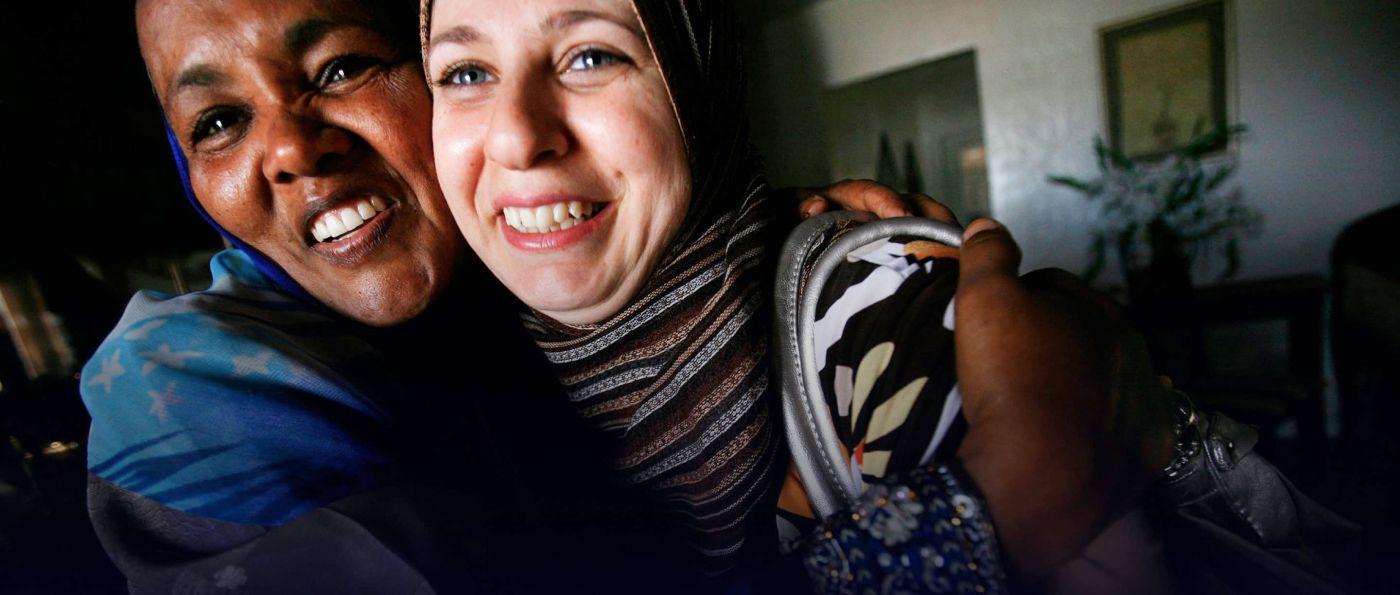FAQs on recent changes to sponsorship

SPONSORSHIP FAQS
Answers to your questions about sponsorship and welcoming under the new administration. This page will be updated as policy changes are announced.
Humanitarian parole
The U.S. government has ended the Processes for Cubans, Haitians, Nicaraguans, and Venezuelans (CHNV) and paused the Uniting for Ukraine (U4U) and Welcome Corps private sponsorship programs. Americans cannot submit new sponsorship applications, and existing applications will not be processed. On March 21, the U.S. government announced that it will terminate existing humanitarian parole status for CHNV newcomers. Learn more.
Check this page frequently for policy changes that impact sponsorship programs and the newcomers who benefit from them. Sponsors are encouraged to help newcomers connect with legal services and determine if newcomers are eligible for alternative legal status. Learn more in our guide to alternative legal options for humanitarian parolees.
How does the executive order work, and what does it mean for sponsors and newcomers?
Humanitarian parole is a temporary immigration status that allows individuals facing urgent humanitarian crises to enter the U.S. legally. It is a discretionary status that can be granted or ended at any time by executive order of the president.
On Jan. 23, 2025, the Department of Homeland Security issued a notice directing immigration officials to review cases of individuals who are currently in the United States on humanitarian parole to determine whether to terminate their parole status and begin the process to remove them from the United States back to their home country. This includes beneficiaries of Processes for Cubans, Haitians, Nicaraguans, and Venezuelans and, possibly, Uniting for Ukraine as well as Afghans with parole status.
We do not yet know how this guidance will be implemented or enforced, but we will share updates as we receive more information.
Newcomers with humanitarian parole status should apply for a more durable status as quickly as possible, ideally asylum if they are eligible. In general, deportation efforts are not directed at those who have a pending asylum application. Please consult our guide to alternative legal status options.
Sponsors seeking information about applications they have submitted may seek constituent services from their congressional representatives to inquire about the status of their application or share their support for sponsorship programs. Click here to consult our sponsor guide on contacting your congressional representative for help.
What’s the latest on CHNV?
On June 12, 2025, the Department of Homeland Security announced that it began sending termination notices for humanitarian parole status and work authorization to individuals who arrived in the U.S. through the Processes for Cubans, Haitians, Nicaraguans, and Venezuelans (CHNV) sponsorship program.
Individuals affected received notification through their myUSCIS account.
If a newcomer you know has been impacted by this decision:
- Get legal help immediately: All individuals with a primary status of humanitarian parole should consult an immigration attorney immediately. Find an immigration attorney through the American Immigration Lawyers’ Association search tool.
- Consult our parole termination resources hub, which includes resources to understand newcomers’ rights and possible next steps.
- Sponsors can consult our guide to alternative legal options for humanitarian parolees to seek professional legal counsel.
What’s the latest on U4U?
As of Jan. 28, 2025, the U.S. government has paused the Uniting for Ukraine (U4U) program. No new U4U applications are being accepted, pending cases won’t be processed, and no new travel authorizations are being issued.
In Aug. 2025, U.S. Citizenship and Immigration Services (USCIS) resumed processing U4U renewal (re-parole) applications for Ukrainians who are here in the U.S. Ukrainian newcomers who have already arrived in the U.S. via U4U may be eligible for re-parole. However, the pause on new U4U applications for Ukrainians outside of the U.S. is still in place. For more information, see this guidance by the Ukraine Immigration Task Force on how to submit a re-parole application and when to consider expedited processing.
If your U4U beneficiary is still awaiting a renewal for parole or work authorization, we encourage you to contact your congressional representative and submit a constituency request for their staff to file a congressional inquiry to USCIS checking on the status of their case. You can reference our contact your representative guide to learn how to submit this request.
To understand eligibility for alternative legal status options, check out our guide to alternative legal options for humanitarian parolees and seek legal advice from an immigration attorney.
Do any of the executive orders issued impact Uniting for Ukraine?
On Jan. 23, 2025, the Department of Homeland Security issued a notice directing immigration officials to review cases of individuals who are currently in the United States on humanitarian parole to determine whether to terminate their parole status and begin the process to remove them from the United States back to their home country. This includes beneficiaries of Processes for Cubans, Haitians, Nicaraguans and Venezuelans and, possibly, Uniting for Ukraine as well as Afghans with parole status.
Newcomers who arrived through Uniting for Ukraine should apply for more durable status as quickly as possible, ideally asylum if they are eligible. Historically, deportation efforts are not directed at those who have a pending asylum application. Please consult our guide to alternative legal options for humanitarian parolees, and consider ways you can support newcomers to apply for this status, for example, by connecting them with legal services.
What happens to my pending application or approved sponsorship if the newcomer hasn’t arrived yet?
With the pause of the U4U program and the end of the CHNV program, pending applications or approved sponsorships for newcomers that have not arrived will not be processed.
These programs are not accepting new applications, pending applications will not be processed, and no new travel authorizations are being issued. We are closely monitoring official updates and will share further information as it becomes available.
If you have questions about a specific case, you can ask your congressional representatives to follow up directly with USCIS on your behalf. Use our guide for information on how.
I’m signed up or have applied to sponsor someone through the Welcome Connect platform. What happens next?
Does the end of the CHNV program and pause to the U4U program mean the newcomer I sponsored lost their humanitarian parole status?
The DHS announced that it will terminate the humanitarian parole status for individuals who arrived in the U.S. through the CHNV program. Termination of parole will take effect 30 days after the official notice is published. The expected publication date of the notice is March 25, 2025, meaning parole would be terminated on April 24, 2025. Additionally, if an individual's parole is set to expire earlier, termination would occur on the expiration date. DHS intends to prioritize removing individuals from the U.S. who haven’t applied for another status, like TPS or asylum, by March 25, 2025. View our CHNV policy explainer page for more information and resources.
This order of termination is specific to individuals who were sponsored through the CHNV sponsorship program. It does not apply to individuals who arrived in the U.S. through U4U, however recent reports suggest the government may also terminate humanitarian parole status for this population. Individuals who arrived through U4U and do not have another status or a pending application for another status, such as TPS or asylum, should seek professional legal counsel and apply for alternative legal status, if eligible. Learn more about applying for another status in our guide to alternative legal options for humanitarian parolees.
How does the pending lawsuit related to the termination of parole affect the CHNV or U4U newcomer I sponsored?
We are tracking the Doe v. Noem lawsuit that challenged the U.S. government’s actions to end humanitarian parole processes including CHNV and U4U. We will provide updates once a final order is made. For more up-to-date information, you can follow the case here.
Welcome Corps
The Welcome Corps, part of the U.S. Refugee Admissions Program (USRAP), has been terminated by President Trump’s administration. Refugee arrivals to the U.S. have been halted, and the program is no longer accepting or processing new or active applications.
Refugees who have already arrived in the U.S. through the Welcome Corps will not lose their legal status.
Can I still submit a Welcome Corps application?
No. The Welcome Corps program, which was a refugee sponsorship initiative within the U.S. Refugee Admissions Program (USRAP), was terminated in Feb. 2025. The Welcome Corps is no longer accepting new applications, and pending applications will not be processed or certified.
I have an application in process. What happens next?
Refugee cases that have already been referred into USRAP through a certified Welcome Corps application currently remain in the pipeline, though their processing is on hold and no flights are being scheduled for refugee arrivals.
How can I share my support for sponsorship programs or get help with my case?
You can:
- Contact your congressional representatives to express support for refugee sponsorship programs or get help with your application.
- Use our guide for contacting your federal representatives for detailed instructions.
Are Special Immigrant Visa (SIV) holders still able to arrive in the U.S.?
The U.S. Department of State has halted all immigrant and nonimmigrant visa issuance for Afghan passport holders, instructing consular officers not to issue visas, including those already printed, effective Nov. 28, 2025. This pause applies to visas across the board, including Special Immigrant Visas (SIV). Afghan SIV holders who already have valid visas and travel documents in hand should still be able to travel to the United States.
In addition, as mentioned above, Afghans are affected by the broader pause on immigration application processing and asylum application decisions. Afghans are also subject to re-review if they arrived in the United States or had an immigration application approved by USCIS on or after Jan. 20, 2021.
General Q&A
What can I do right now to support newcomers?
- Help newcomers apply for permanent legal status if eligible, like asylum.
- Reach out to your congressional representatives to offer your support for sponsorship programs. Use our guide to get involved.
- Stay informed by visiting our website for updates and resources.
Have asylum applications been paused?
There have been no changes to the asylum process for people applying from within the United States. Recent changes have limited asylum for people applying at the U.S. border.
It’s hard to refer newcomers to immigration attorneys because the waitlists to be seen are so long. Is there anything else we can do?
We know it can be challenging to find and access an immigration attorney. We are providing resources here to help expand your search. In addition to these tools, you might consider reaching out to your network to ask for referrals for an initial consultation from an attorney in your community or virtually.
You can view a list vetted immigration attorneys by the American Immigration Lawyer’s Association here. Additionally, many local immigrant service organizations provide free or low-cost legal services as Board of Immigration Appeals Accredited Representatives, which are listed here by state.
Last updated March 21, 2025.

